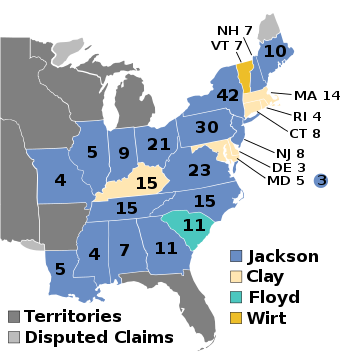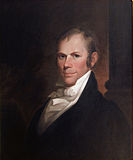U.S. presidential election, 1832
|
|
|||||||||||||||||||||||||||||||||||||||||||||||||||||||||||||
|---|---|---|---|---|---|---|---|---|---|---|---|---|---|---|---|---|---|---|---|---|---|---|---|---|---|---|---|---|---|---|---|---|---|---|---|---|---|---|---|---|---|---|---|---|---|---|---|---|---|---|---|---|---|---|---|---|---|---|---|---|---|
|
|||||||||||||||||||||||||||||||||||||||||||||||||||||||||||||
|
All 286 electoral votes of the Electoral College 144 electoral votes needed to win |
|||||||||||||||||||||||||||||||||||||||||||||||||||||||||||||
| Turnout | 55.4% |
||||||||||||||||||||||||||||||||||||||||||||||||||||||||||||
|
|||||||||||||||||||||||||||||||||||||||||||||||||||||||||||||

Presidential election results map. Blue denotes states won by Jackson and Van Buren or Wilkins, yellow denotes those won by Clay/Sergeant, teal denotes those won by Floyd/Lee, and orange denotes those won by Wirt/Ellmaker. Numbers indicate the number of electoral votes allotted to each state. Two votes were not given in Maryland. a30 Pennsylvania electors voted for William Wilkins for Vice President.
|
|||||||||||||||||||||||||||||||||||||||||||||||||||||||||||||
|
|||||||||||||||||||||||||||||||||||||||||||||||||||||||||||||
The United States presidential election of 1832 was the 12th quadrennial presidential election, held from Friday, November 2, to Wednesday, December 5, 1832. It saw incumbent President Andrew Jackson, candidate of the Democratic Party, easily win re-election against Henry Clay of Kentucky, candidate of the National Republican Party, and Anti-Masonic Party candidate William Wirt. Jackson won 219 of the 286 electoral votes cast. Virginia Governor John Floyd, who was not a candidate, received the electoral votes of South Carolina.
This was the first national election for Martin Van Buren of New York, who was put on the ticket to succeed John C. Calhoun as vice-president and four years later would succeed Jackson as president. Van Buren faced opposition for the vice-presidency within his own party, however, and as a result, all 30 Pennsylvania electors cast ballots for native son William Wilkins.
With the demise of the Congressional nominating caucus in the election of 1824, the political system was left without an institutional method on the national level for determining presidential nominations. For this reason, the candidates of 1832 were chosen by national conventions. The first national convention was held by the Anti-Masonic Party in Baltimore, Maryland, in September 1831. The National Republican Party and the Democratic Party soon imitated them, also holding conventions in Baltimore, which would remain a favored venue for national political conventions for decades.
...
Wikipedia




